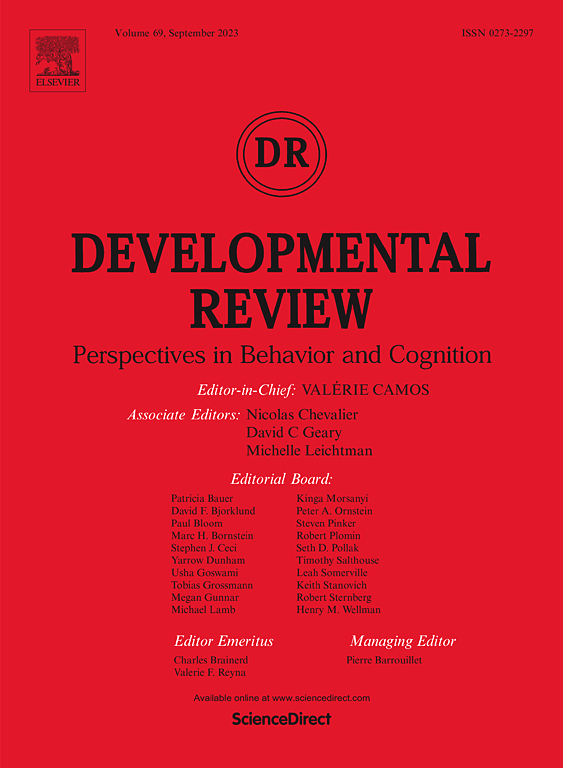从“此时此地”到“彼处彼时”:亲子非语境化对话如何支持早期发展
IF 5.6
1区 心理学
Q1 PSYCHOLOGY, DEVELOPMENTAL
引用次数: 0
摘要
去语境化语言(DL),指的是抽象的、空间的、时间的、或个人从直接语境中转移出来的概念和事件,已被证明可以促进儿童的语言、认知和社会情感发展。由于对亲子深度学习的研究跨越了多个学科、理论和方法传统,因此仍然缺乏一个全面的框架来定义深度学习,并检查将深度学习的独特属性与早期发展联系起来的机制途径。这篇综述提出了一个框架,沿着三个相互关联但不同的维度描绘DL:它的功能,与感知上下文的关系,和语言形式。本文还分析了文化、社会、个人和背景因素如何影响父母深度学习投入的个体差异,强调了社会和文化因素。此外,本综述阐明了亲子非语境化对话与儿童语言、认知和社会情感技能之间的联系,以及潜在的机制。我们认为,三维的、基于梯度的深度学习视角可以更精细、更系统地探索深度学习的发展转变和个体差异。这种方法也有望加强我们对其发展影响和潜在机制的理解。在结束语中,我们提供了关于使用该框架为编码和分析选择提供信息的实用建议,并讨论了我们认为在深度学习研究中优先考虑的领域。本文章由计算机程序翻译,如有差异,请以英文原文为准。
From the “Here and Now” to the “There and Then”: How parent–child decontextualized conversations support early development
Decontextualized language (DL), language referring to concepts and events that are abstract or spatially, temporally, or personally displaced from the immediate context, has been shown to bolster children’s language, cognitive, and socioemotional development. Because research on parent–child DL spans multiple disciplinary, theoretical, and methodological traditions, a comprehensive framework defining DL and examining the mechanistic pathways linking DL’s unique attributes to early development remains absent. This review proposes a framework that delineates DL along three interrelated yet distinct dimensions: its function, relation to the perceptual context, and linguistic form. It also analyzes how cultural, social, personal, and contextual factors contribute to individual differences in parents’ DL input, emphasizing social and cultural factors. Additionally, this review elucidates the demonstrated links between parent–child decontextualized conversation and children’s language, cognitive, and socioemotional skills, along with the underlying mechanisms. We argue that a three-dimensional, gradient-based view of DL can enable a more refined and systematic exploration of developmental shifts and individual variation in DL. This approach also promises to enhance our understanding of its developmental implications and underlying mechanisms. In the concluding remarks, we provide practical recommendations on using this framework to inform coding and analytical choices and discuss areas we deem as priorities in DL research.
求助全文
通过发布文献求助,成功后即可免费获取论文全文。
去求助
来源期刊

Developmental Review
PSYCHOLOGY, DEVELOPMENTAL-
CiteScore
11.00
自引率
3.00%
发文量
27
审稿时长
51 days
期刊介绍:
Presenting research that bears on important conceptual issues in developmental psychology, Developmental Review: Perspectives in Behavior and Cognition provides child and developmental, child clinical, and educational psychologists with authoritative articles that reflect current thinking and cover significant scientific developments. The journal emphasizes human developmental processes and gives particular attention to issues relevant to child developmental psychology. The research concerns issues with important implications for the fields of pediatrics, psychiatry, and education, and increases the understanding of socialization processes.
 求助内容:
求助内容: 应助结果提醒方式:
应助结果提醒方式:


